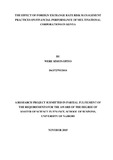| dc.description.abstract | Multinationals Corporations play an important role in Kenya’s economy through; offering
employment opportunities, creating market for local products, enhancement of infrastructure
around the areas they operate, access to the global market, culture exchange, globalization and
medium through which local firms acquire better standards and cutting edge technology.
Management of foreign exchange risk by multinational corporations is very essential because of
their involvement in international trade. In this paper, we investigated the effect of foreign
exchange risk management practices on the financial performance of multinational corporations
in Kenya. Descriptive research design was used to discover causal relationships between foreign
exchange risk management practices applied by multinational corporations and the effects on
their financial performance. The sample of the study consisted of thirty multinational
corporations. Secondary data was collected from annual reports, publications and supplements in
newspapers, for a period of five years, between 2010 and 2014.
The data was analysed using the SPSS version 20 to generated descriptive statistics was
presented in tables, such as range, maximum, minimum, standard deviation, variance, skewness,
kurtosis and mean. Inferential statistics were conducted. Regression analysis established
coefficient of determination (R2) of 0.644. This meant that the model explained 64.4% of the
variation in financial performance from the impact of foreign exchange risk management
practices. From the analysis of variance, the significance F was close to zero, this implied that a
combination of all of the independent variables contribute to changes in financial performance of
the firm. The p-values for forward exchange contracts and interest and currency swap contracts
were less than 0.05, implying that the variables were statistically significant in determining
financial performance of the multinational corporations. However, the p-values for interest and
currency option contracts, was more than 0.05 implying that the variable do not have statistical
significance on the financial performance.
The study suggests that due to the volatile situation of Kenya shillings, further research should
be undertaken on the relationship between foreign exchange risk exposure of local companies
and their operational efficiency. The study also suggest that other variables should be used to measure the impact of foreign exchange risk management, including the cost of foreign denominated debt, foreign-denominated debt as a proportion of total debt on the financial performance of multinational corporations. | en_US |

